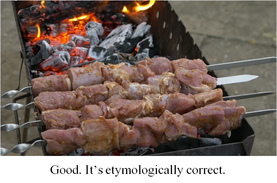|
It's clear just by looking at the word kebab that it's not of Indo-European origin. As with many foodstuffs, the etymology of the word follows a similar geographic path as the history of the product's diffusion. So here, we get kebab from Turkish kebap (from whence siskebap, the precursor of shish kebab). This may have passed through an Iranian but Indo-European language in Urdu or Persian, but ultimately traces to Arabic kabab. Here, the noun becomes a verb as we travel further back in time to Aramaic, where kabab sounded like kbb and meant "the action of roasting meat", which most of the time is done on a stick. The Aramaic word is then from a completely hypothesized Afro-Asiatic root kab, meaning "to burn", or possibly just "burnt". It's pretty cool here how kebab travels through three separate language families to get where it is right now.
0 Comments
Your comment will be posted after it is approved.
Leave a Reply. |
AUTHORHello! I'm Adam Aleksic. I have a linguistics degree from Harvard University, where I co-founded the Harvard Undergraduate Linguistics Society and wrote my thesis on Serbo-Croatian language policy. In addition to etymology, I also really enjoy traveling, trivia, philosophy, board games, conlanging, and art history.
Archives
December 2023
TAGS |



